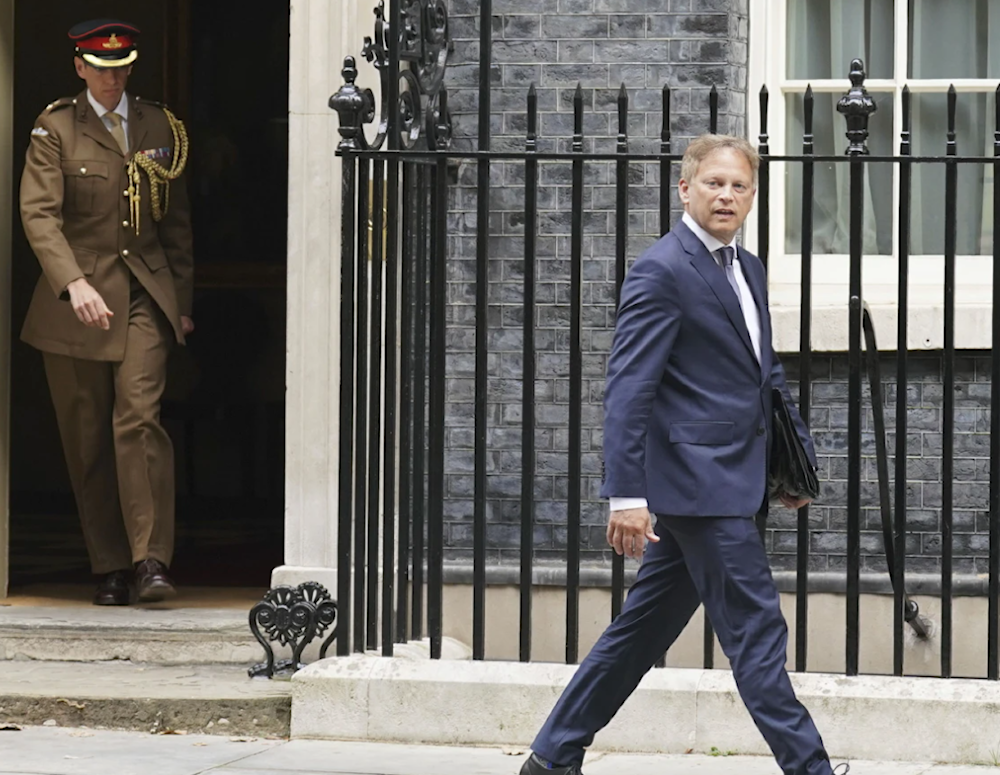UK MoD slapped with 'utter betrayal' over new housing policy
Starting next month, the Ministry of Defense will amend the criteria throughout the Army, Navy, and RAF.
-

Grant Shapps leaves Downing Street after being appointed Defense Secretary, on August 31, 2023. (AP)
The UK Ministry of Defense has been accused of "utter betrayal" over a new military lodging plan that eliminates rank-based housing allocation.
A group of Army wives has begun a campaign urging the government to reconsider its new housing policy, which would result in many families being transferred into smaller living quarters.
Servicemen and women, together with their families, are housed on or near military bases. Staff members have always been rewarded with larger residences as they advance through the ranks.
However, starting next month, the Ministry of Defense will amend the criteria throughout the Army, Navy, and RAF so that for the first time, dwellings are given based on how many children a serviceman or woman has, not their rank.
Officers with smaller families would suffer the most from the policy, known as the Modern Accommodation Offer (MAO), which reduces their living space.
The decision has prompted uproar among the families of cops, who are frequently compelled to relocate across the nation every two or three years and have little to no control over where they reside.
Rosie Bucknall, the wife of an Army captain, told the defense select committee in written testimony that the "social contract" that exists between the military and its troops will be "eroded" if the plans are carried out.
Bucknall told The Telegraph that the offer has been degraded over the past decades.
“For officers and their family members, who have made personal and financial sacrifices for 10 or 20 years, this is utter betrayal.”
A shrinking military
A petition by Army spouses seeking a "review" of the policy has garnered 16,000 signatures. The report cautions that Armed Forces retention rates would be affected if the policy follows through.
The military is experiencing significant recruiting and retention issues, with the number of persons departing the Armed Forces increasing by over a fifth at the end of last year.
A former senior US general expressed concern over the diminishing number of troops in the British army, pointing out that it is no longer as formidable as it once was, amid calls for secretaries to address the military recruitment crisis facing the country.
Recent analysis indicates that the British army's numbers will fall below 70,000 soldiers within the next two years, prompting both US and European generals to question whether the UK remains a top-tier fighting force, as reported by The Daily Mail last month.
Lord Dannatt, the former chief of the Army, has warned that the new model might be a "tipping point" that compels officers to enter the private sector, further reducing the military's already shrunken numbers.
According to quarterly military personnel data, 792 Army officers departed the service early in the recent quarter, up from 450-550 each quarter during the previous decade.
Housing conditions have been a reason for decreased recruitment with a 2023 study indicating that the most often mentioned reason for quitting the military was the "impact on family and personal life."
According to a recent survey done by the families of military officers, 78% of the 342 respondents plan to quit if the new offer is implemented.
Under the MAO, military families will not be compelled to relocate immediately but will be assigned housing at their next assignment under the new guidelines.
Working together, socializing separately
The military now provides instructions on the size of dwellings, in square feet, to which different ranks are entitled.
However, according to the guidelines, warrant officers with one or no children will lose 10% of their housing area.
Brigadiers with the same family structure are expected to lose 45% of their dwelling area.
It implies that a captain with two children who are now living in a three-bedroom house may be relocated to a three-bedroom house in soldiers' quarters, which is around 20% smaller for the same amount of bedrooms.
Lord Dannatt stated that the military has traditionally operated on a hierarchy, with troops and officers working together but living apart.
Dannatt stated that there have "always been married quarters and soldiers quarters,” explaining that they may work together but socialize separately.
"Officers should live amongst each other, and non-commissioned officers and soldiers should live together, to avoid the difficulties of your next-door neighbour being your boss or one of your subordinates.”
An MoD spokesperson stated, “We’re now allocating housing based on need, rather than rank, and modernising accommodation by recognising for the first time those in established long-term relationships and parents with non-resident children.”

 5 Min Read
5 Min Read








